THE FUNNIEST RABBI
IN CLEVELAND
I ran into a funny rabbi the other night. Happens. Some rabbis are funny. Rabbi Matt Eisenberg told me he is the “second funniest rabbi in Cleveland.” Why number-two? He explained he came in second in Cleveland’s Funniest Rabbi Contest in 2011. Fourteen years later, he’s still funny. He did a clever Purim shpiel based on Fiddler on the Roof.
I was a judge at the funniest rabbi contest once, but not the year Rabbi Eisenberg participated. I was a judge a couple years later. The winner that year wasn’t even a rabbi. The funniest rabbi in Cleveland in 2013 was a doctor/mohel — Kiva Shtull.
The judges made comments after each rabbis did their shtick. We rated the ravs. Afterward, an audience member said to me, “You were very nice in your comments.”
Why not? Author Theodore Dalrymple wrote (about “comedian” Boris Johnson of England), “Telling a joke that falls flat is an excruciating social experiment.” Telling original jokes, non-stop, in front of 200 people at the Schmaltz Museum of Jewish Heritage — that’s not for the faint of heart or your typical pulpit rabbi. I had stocked-piled complimentary adjectives in advance. My arsenal was droll, gut-busting (didn’t use that one), cheery, sharp, zany, wacky, witty and perturbing.
Nobody was perturbing, unfortunately.
I gave the highest rating to the mohel, who moonlighted as the spiritual leader of Congregation Shir Shalom in Bainbridge Township, Ohio. He got wry, droll and zany. (The shul went under about a year later. I don’t know why.)
I just rediscovered a video of Dr. Shtull’s comedy routine. It holds up, at least for the first couple minutes. I’m not sure if Rabbi Eisenberg — the second funniest rabbi of 2011 — has a video. Probably. But check out Shtull’s shtick. Listen at least till you hear the word Chabad — around the two-minute mark.
March 19, 2025 2 Comments
GROW UP
I put a latch on my bedroom door to keep my parents out. I was a grown-up — in my early twenties. I was at my parents’ Beachwood apartment, the Mark IV (featured a couple weeks ago in a Klezmer Guy post). The Mark IV was later called The Hamptons and is now The Vantage. I was listening to John Handy’s “Don’t Stop the Carnival” on my record player. There was talk about real estate and bridge games. I pondered some prospective book titles:
Suburban Nightmare
Rebounding from the Bar Mitzvah Trail
Confessions of a Bar Mitzvah Wino
He played Clarinet Between his Legs
Unstuck Pads
The Bar Mitzvah-Goer
Maybe I thought about bar mitzvahs because I never had one. I was Confirmed, Reform-style. (In my adulthood, I did leyn Torah a couple times.)
I swam in the Mark IV apartment pool and got in an argument with an old guy — maybe 65. He said, “You’re going to bump into my grandkids and you’ll be sorry you did!”
Lay off, man. (I love grandkids — 50 years later.)
My dad considered selling me his beater car, a Plymouth Valiant, so I could drive away from Beachwood. He said, “But if you get the car, what are you going to do to support it?”
“I’ll get some money somewhere. I’ll rob a bank.”
“You do that and I’ll wipe my hands of you!”
Simmer down, Dad. I bought the car, but I didn’t drive too far. I went four miles west to Cleveland Heights and rented a room in half-a-house.
Where else could I have gone? Boston was too collegiate. New York? I had been there and had had my ride towed. New York is a tough town for cars. Go back to Ann Arbor? Too many kids there. California? Too hard to get to.
Tough times . . .
My dad said, “You don’t know what a tough is!”
Change your place, change your life. I met a girl via the ride board at Case Western Reserve University. (A lot of my life revolved around that CWRU board.) The girl was Jewish, cute and English. A true trifecta. We hitchhiked to California, and somewhere near Knoxville she told me she was going to meet up with her boyfriend in California. Bummer road!
Because of the “chick” factor, we even got rides from truckers.
I ran into the English girl again, in Israel a year later. She said nothing had materialized with the “boyfriend” out west (and nothing much happened with me and her in Eretz Yisrael).
California . . . I said cheerio to the English woman and hitched back east solo. When I walked into my parents’ apartment, my dad said, “Isn’t that a pistol.”
I guess it was. As Isaac Bashevis Singer wrote, “Life was too good to us. We had to ask for trouble.” I looked for trouble, somewhat unsuccessfully.

Isaac Bashevis Singer
March 11, 2025 6 Comments
BURY ME AT HORSESHOE LAKE
–A FAREWELL TO AN OLD FRIEND
(This essay was in the Cleveland Plain Dealer on Sunday.)
Even if you’re rich, you can’t always get what you want. For example, you can’t buy Horseshoe Lake, which straddles Shaker Heights and Cleveland Heights. An assortment of neighborhood high-rollers, medium-rollers and salt-of-the-earth ex-hippies tried to save Horseshoe Lake. These lake-lovers funded lawsuits against the cities of Shaker Heights, Cleveland Heights and the Northeast Ohio Regional Sewer District.
We fought the law and the law won.
I was a founder of Friends of Horseshoe Lake. We paid for the lawsuits and an engineer’s evaluation of the defunct dam. We wrangled a couple thousand signatures on a petition to save the lake, but not enough people cared.

Horseshoe Lake when it was a lake. (Photo by Lucy Stratton)
The Sewer District is going to turn the former lake — which was drained almost six years ago — into a boardwalk and nature preserve. They plan to rip down some trees and put in a paved service road. Is the road a homage to the never-built Clark Freeway that the county wanted to put through the Shaker Lakes area in the 1960s?
I have a friend who lives a mile from Horseshoe Lake. He lives near Lower Shaker Lake. He said, “I have my lake. I don’t care about yours.” The notion of NIMBY (Not in my Backyard) doesn’t travel well; you get about a mile from the Horseshoe Lake, and not that many people get worked up about its disappearance.
Granted, there are more pressing issues than Horseshoe Lake, like crime, housing matters and leaf blowers. But how many boardwalks and little playgrounds do we need? We already have the Nature Center at Shaker Lakes. Even a “lake feature” is lacking at the upcoming Horseshoe park. The Sewer Board is spending $28.7 million – up from the original $14 million – and that doesn’t include another $8.6 million for amenities, which supposedly Shaker Heights and somewhat-financially-strapped Cleveland Heights are expected to cover.
The Sewer District and the Ohio Department of Natural Resources claim the goal is to prevent a flood disaster downstream in University Circle. Nobody has died from a flood there, but you never know. Every hundred years a person might die in a storm under the Cedar Road Rapid tracks. And I might get hit by a bus tomorrow.
I live about a football-field away from the late great Horseshoe Lake. I used to live several miles away and visited often. Horseshoe Lake was calming. It was blue and serene. I couldn’t bike out to Lake Erie that often; that’s a six-mile schlep from Cleveland Heights. The Metroparks aren’t too close to the Heights either. Speaking of which, our lawyer talked with Metroparks’ people, and the park system wasn’t highly motivated to save Horseshoe Lake. On a stroll around the Heights, I ran into retired Cleveland city planner Bob Brown. He said he thought the Sewer District’s plan for the Horseshoe area “doesn’t look so horrible.” I hope Bob is right.
In winters I used to walk across the frozen lake. There were signs posted against it, but the water wasn’t that deep, and I figured if I fell into the lake. it would be a classy exit. Now what can I fall into? A playground amenity? No, thanks.
March 4, 2025 No Comments
YOU CAN GO HOME AGAIN

The Mark IV apartments, Beachwood, Ohio
I’m at my parents’ apartment near I-271. So loud — the highway. I’ll hitch down to Cedar-Taylor to get some air.
I’d like to see Sleeper and American Graffiti.
Cleveland . . . it makes one stop and think. I’m thinking of Boston and New York.
The history of the Jews. My parents grew up in the Kinsman neighborhood. Ezra lived in Babylonia.
How do you get the girls if you don’t go near them?
I left my heart in Sandusky.
My friend Chap drove his Corvette up and down Mayfield Road with 11 other Corvette drivers. Chap has a 350-hp engine with headers, minus emission controls.
I saw Sleeper. I resented the Jewish stereotypes.
Stan Smith vs. John Newcombe.
Never write about a place you haven’t done time in. And detail-for-detail-sake is useless.
I don’t want to live here.
—
Recap:
My dad said, “I’m sure you’ll be a success some day.”
At what? Whatever, I should do a good job of it. My father never said to me, “What are your plans? What do you see yourself doing in ten years?” That would have been cruel.
My post-college days were hell, but not that hellish. My mother lined up blind dates for me. The dates were usually with daughters of my mom’s friends. I took the girls to bars and restaurants and ordered 7&7s. That was my booze repertoire: 7&7.
Then I got feedback about the dates from my mother, who picked up tidbits at bridge games. Some of the girls liked me, some didn’t. One date thought I was “a little weird.”
She was weird. She had no business dragging me through her dad’s kangaroo court (his living room had World War II medals on the wall). What are my plans? What do you do?
What’s an apricot sour? That’s what the girl ordered at the bar.
Chap asked me to go to the Corvette rally at Manner’s Big Boy, Mayfield Heights. He had a brand-new 1974 ’Vette. He said, “You think you’re too good for my ’Vette, Stratton. You’d prefer a VW bus with a hippie slut. Why not try real chicks and real cars . . . Friday night at the Strongsville Holiday Inn, it’s crawling with chicks and ’Vettes. No, you’d rather be in Cleveland Heights. Any city that has a bumper sticker like that is a losing proposition.”
When my sentence (nine months) at the Mark IV was up, I moved to Cleveland Heights, into a double, sharing it with three guys I met off the Case Western Reserve rooms-for-rent bulletin board.
I’ve been in Cleveland Heights ever since, and I haven’t seen Chap in more than 35 years. He doesn’t hang around klezmer concerts, for one thing. Alice knocked on the door of the Cleveland Heights double in 1977, looking for a room to rent. Mom’s Dating Service, RIP.
February 26, 2025 4 Comments
SHOULD I RENT TO A STRIPPER?
This acclaimed animation is from the guys over at Challah Barbaric. The vid (below) may seem, at first glance, to be navel-gazing. It’s not. It’s magic. The two main characters — a sleazy guy and a bug-eyed naïf — turn the cutthroat world of real estate into something warm and fuzzy and slightly erotic — or robotic.
The landlord in the vid is so pompous at first. Then more so. The plot twist: the young lady draws forth the landlord’s humanity and even a Peter, Paul and Mary lyric.
Should I rent to a Stripper? 2:57 minutes. United States . . .
February 18, 2025 2 Comments
WHAT’S YOUR TIME WORTH?
My time is worth $107.98 an hour.
I lost two harmonicas at a gig yesterday. I never lose anything. And I had bragged about finding my wife’s Visa card, which had been missing for a day. Alice considered calling the 800-number and canceling. No, Alice, that’s nightmare city. Alice walked in the snow for four miles looking for the Visa card, which she thought might have fallen out of her pocket while biking.
She didn’t find the card. I found it in the bedroom under a bed. I don’t know how the card got there. I always use a flashlight to search for missing stuff. That’s my trick; the flashlight helps me focus.
My harmonicas were in a gig bag, which I hadn’t fully zipped. I think the harps wound up in the snow in the parking lot at a nursing home, where I had a gig last night. I didn’t “hear” the harps fall in the snow. The last time I lost something was a ski cap — also in the snow.
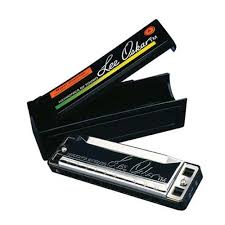
I think I’ll order two harps on Amazon, $107.98 total. The harmonicas will arrive tomorrow. I don’t feel like driving 16 minutes each way to the nursing home to look for the harps. That’s 12 miles round-trip — a significant haul by Cleveland standards. And then another half hour looking for the harps.
I’ve called the nursing home. So far, nothing.
My two choices: 1) pay $108 for two harps, or 2) drive 32 minutes, plus spend time looking for the harps in the snow. And don’t forget the depreciation on my car.
(“Yesterday” was actually Jan. 16, 2025. I bought the harps.)
February 12, 2025 1 Comment
MY SHORT FOOTBALL CAREER
Nobody is tall in my family. I was 5-feet-2 in ninth grade. But I played on the football team! I rode the bench; the coach wouldn’t put me in. He thought I’d get killed. He had me drill with a similar five-foot guy, who also never saw action.
My parents wanted me to play tennis. Figures.
I suited up for the Benedictine game. The head coach wanted “a lot of presence,” as he put it, so he brought the entire 9th-through-12th-grade team to the game– frosh (including me), JV, and varsity. This was 2002, when Benedictine had Ray Williams, who went on to win the “Mr. Football” award for best high school player in Ohio. He signed with West Virginia University.

Ray Williams
Our coach warned us all year about Williams. About 80 of us got on the school bus for Benedictine. We were a presence. And then in the very first play, Williams ran with it and we knew we were toast.
Williams wound up an accessory to a murder, so he never played at West Virginia. He played some at Toledo, but I think he screwed that up, too. And then he played a bit at Shaw University in North Carolina. I wonder what happened to him. There’s a documentary about him, Mr. Football, but it apparently has never played anywhere.
All I know is Ray Williams was an absolute beast at Benedictine. I watched him absolutely crush for 40 carries a night. Everyone knew who was getting the ball, every snap, but no one could stop the kid.
For the record, I’m now 5-feet-9, in my thirties and playing tennis.
(fiction)
February 4, 2025 1 Comment
JEOPARDY REDUX
Ted Stratton was on Jeopardy 20 years ago. On January 21, 2005, to be exact. That afternoon I went to Hillcrest cemetery to tell my parents about the impending evening show. Snow covered all the flat-level headstones at Hillcrest. I found “Siegal” but not “Stratton.” However, I think I made successful contact with my parents.
But how about connecting with the president of the United States? What if George W. Bush declares war on some country today and the Jeopardy show doesn’t air tonight?
I emailed everybody about the show. I played tennis. But I couldn’t concentrate on no tennis game!
I knew, in advance, the outcome of Ted’s Jeopardy game; I had been to California for the taping three months before. But I wasn’t allowed to tell anybody the result. The day of the airing (and cemetery visit), a friend said, “Bert, you wouldn’t be throwing a party tonight if Teddy hadn’t won.” Maybe. I didn’t answer her. I planned to host a viewing get-together. I worried some more about W. and war.
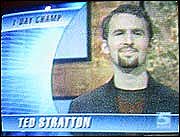
Ted faced a Boston book editor and “a graduate student originally from Johnson City, Tennessee,” which is Jeopardy-talk for “This guy from Tennessee is now living in Cambridge, Massachusetts, running a lab at MIT.”
Ted was formidable, don’t ever forget that. For instance, he cleaned up in the category of “Our Lady,” about Catholic shrines, like Our Lady of Czestochowa (Poland) and Our Lady of Gethsemani (Kentucky). Ted — a recent Brandeis graduate — knew his Catholic shrines.
(There’s a play-by-play of all recent Jeopardy games on J! Archive, a site run by Robert Knecht Schmidt, a Clevelander and former Jeopardy contestant.)
Going into Final Jeopardy, Ted was in second place, the Boston editor and defending champ was in third, and the Tennessee grad student was in first. The Final Jeopardy category was “Fictional Children.” The question was “This boy, introduced in a 1902 book, flew away from his mother when he was 7 years old.”
Merv Griffin made a fortune on the Jeopardy think music, which he wrote. And he owned the show, too, which he sold to Sony.
I felt like I was watching my kid line up a 50-yard field goal at the Ohio State-Michigan game with a second left on the clock. I was helpless to affect the result. That’s the craziest part about being a parent — all the collateral, out-of-your-control joy and pain. (And it never ends until you end.)
The Boston editor answered, “Peter Pan.”
Correct. She went up to $10,900.
Ted said, “Peter Pan.” He went up to $13,399.
The Tennessee student said, “The Little Prince.” He went down to $7,900.
Alex Trebek announced: “The new champion, Ted Stratton, a reporter from Cleveland Heights, Ohio.”
January 29, 2025 3 Comments
THE CHALLAH FAME BIZ CONFERENCE 2025
The Challah Fame hosts its annual business seminar next week. (The Challah Fame is in the former Beef Corral at Warrensville and Cedar roads, South Euclid, Ohio.)
Klez Biz. Biz hundert un tsvantsik.
The program . . .
Lori Lippitz, director of the Maxwell Street Klezmer Band, speaks on KIS / Klezmer is Simple. “Never play for free, but if you feel like it, no problem.”
Henry Sapoznik, co-founder of KlezKamp. “No ‘Hava Nagila.’ Ever.”
Stanley McChristyl, retired US Army general. “Hire klez musicians with military backgrounds. How to find them? Check out the cats in the Israel Police Orchestra.”
Michael Winograd, clarinetist. “Learn to play ‘Sid’s #1’ in all 12 keys.”
Hankus Netsky, director of the Klezmer Conservatory Band. “Who’s in charge of this 11-piece klez band? I am — sometimes!”
Alan Douglass, pianist. He has played klezmer for 42 years in Cleveland without annoying any klez musicians. “Except one or two.” Learn Midwestern mores.
Steven Greenman, violin. “Klez Etiquette. Is 15 minutes too long for a doina? Nope!”

Alan Greenspan
This year’s seminar closes with a concert featuring Alan Greenspan, age 98, on saxophone, followed by his speech “The straight emes: how to dance the arts/commerce tango.”
Be there.
—
Greenspan went to Juilliard and played saxophone in big bands.
January 22, 2025 1 Comment
A LONG MOVIE, ONE LESS TENANT
AND A GUITAR
My latest Cleveland Plain Dealer essay . . .
A LONG MOVIE, ONE LESS TENANT AND A GUITAR
CLEVELAND HEIGHTS, Ohio — The new Bob Dylan movie, “A Complete Unknown,” is too long and a bit too “unknown” — too much about Dylan-from-nowhere. And it’s two hours and 20 minutes, with 40 songs. I like biopics from somewhere — and shorter. How about Dylan’s year at the Sammy fraternity house at the University of Minnesota, followed by his odyssey to New York’s Greenwich Village? That would have been better.
Maybe I’m not enough of a Dylan aficionado. I’m a fan, but not a fanatic. Irwin Weinberger — who used to play in my klezmer band — is a super-fan. Irwin has been to Duluth and eaten at Zimmy’s Deli in Hibbing, Minnesota. Irwin loved every bit of the movie. When Irwin and the klezmer band played weddings and bar mitzvahs, Irwin would often — by request from listeners — veer from the klezmer music into Dylan, singing “Subterranean Homesick Blues” and “Tangled Up in the Blue” without a cheat sheet. The trick was getting Irwin to stop after two verses.
A tenant left his guitar behind. (My day job is managing apartment buildings in Lakewood.) The tenant said he was going home to Kentucky, taking only what could fit in his car. He said he wasn’t renting a U-Haul because he didn’t have a valid driver’s license. The manager at the building told me the suite was dead-bolted from the inside. I said, “Well, if the place starts to smell, let me know.” Every so often a tenant dies in a suite.
I tried to open the door with the regular key. That, surprisingly, worked. Locks can be finicky, particularly in old Lakewood buildings; you’re never sure you’re getting in until you’re actually in. The suite was above an Indian restaurant and a butcher shop on Detroit Avenue. I found a wooden chair, the guitar, some heavy-metal CDs, a book of Shakespeare plays and Charles Bukowski’s “Notes of a Dirty Old Man.” The guitar was a Chinese Martin knock-off with a solid-body case. The case, alone, was worth something. I’ll give the guitar back to the tenant if he returns, but I doubt he will. I also got some postage stamps from the apartment. Nobody wants stamps except me, apparently. I pay a lot of my bills by mail. I’m 74.
When I was 26 . . .
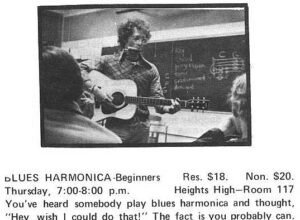
Years ago, I learned a few guitar chords, and now I want to try again. How about, “Dear Landlord”? … “Dear landlord, please don’t put a price on my soul.” Life is complicated. I hunched over the guitar, pressed my fingers to the steel strings, and strummed hard. An acoustic guitar is probably the least ergonomically friendly instrument around. I’m not a 20-year-old made out of rubber.
Dylan mostly plays piano these days. I can see why. He’s 83.
Maybe a tenant will leave me a piano. But please, not a rotted-out 400-pound upright with worn-out strings, dampers and hammers. I “inherited” that piano from a tenant in September. It cost me $500 to junk.
January 15, 2025 3 Comments
THE BEST FAMILY TRIP
OF ALL TIME
Teddy, then 11, insisted we go to Disney World. He wasn’t abiding his mother’s posturing about how Disney World would deliver no “sense of mastery” to him. Let’s go!
This would be Ted’s second Disney trip. He had been to Orlando five years previously with his grandmother, sister and me.
The repeat trip turned out to be the greatest family trip of all time. Ted and his siblings, Lucy and Jack, went absolutely nuts for Figment, Miss Piggy and the Ninja Turtles. And Epcot was cool. The kids spent some time on the floor there — Lucy on top of Jack in the Moroccan restaurant lobby, putting him in a full-nelson.
Ted had researched the vacation, using Unofficial Guide to Disney World. (This was 1993, pre-Web.) Teddy devised our personalized Disney itinerary. We got on popular rides at odd hours and walked in counter-intuitive directions. This was before priority passes and VIP lines. This was when America was Sweden.
Prior to the Disney trips, I had been a snob about amusement parks. If an amusement park was new-ish, we weren’t going. It had to be old and rickety. We had gone to Memphis (Avenue) Kiddie Park, Geneva on the Lake, Kennywood in Pittsburgh, and Conneaut Lake Park in Pennsylvania. Conneaut was the best; it had a carnie booth of caged chickens playing tic-tac-toe. You bought corn kernels from a gumball machine and fed the kernels to the chickens, to motivate them to play tic-tac-toe. The contraption was like out of a B.F. Skinner behavioral-science experiment.
Conneaut closed in 2010. Luna Park closed in 1929. (I didn’t make it to that one.) Euclid Beach Park — the classic Cleveland amusement park — closed in 1969. Geauga Lake, for some reason that was never on my radar.
Disney forever.
—
Teddy’s itinerary . . . This is just the first page (the next two pages are lost to history). 1993. Typed on a Compaq x386. WordPerfect 3.1.
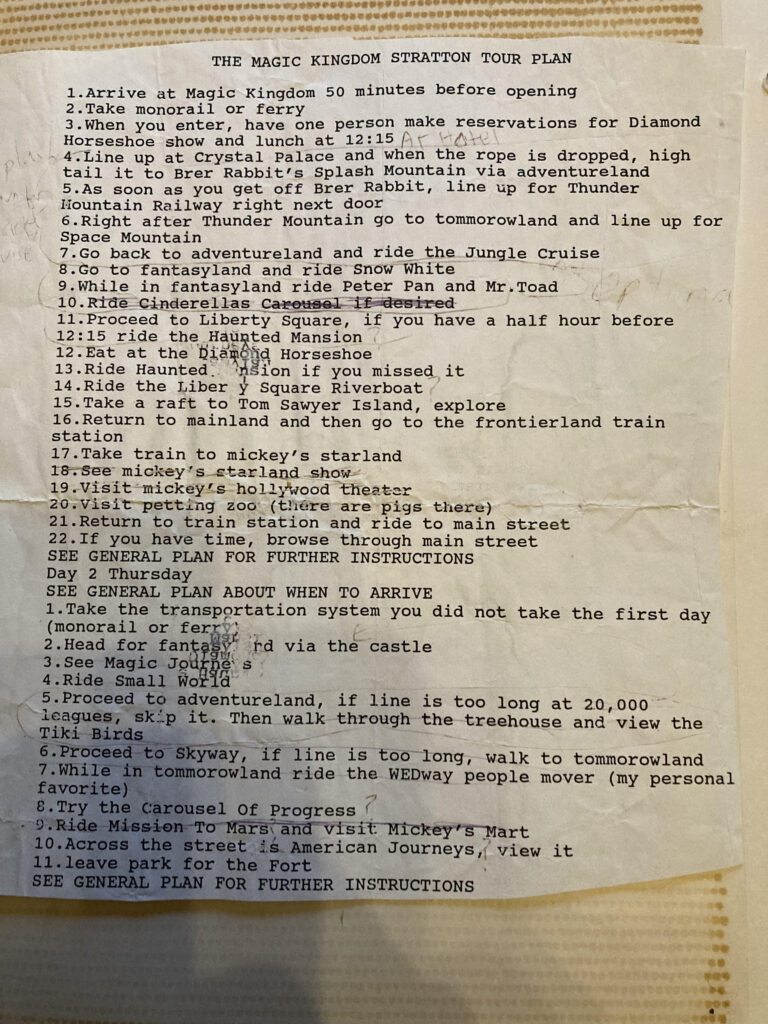
January 8, 2025 6 Comments
GENEALOGY, UGH
The Western Reserve Historical Society is the Cleveland-version of the Church of Latter-Day Saints, minus the religion angle. The historical society has extensive genealogy records. When I walked out of the society’s library, I ran into a library-goer from Chicago. She said, “We just found out something really interesting about our grandparents.”
Genealogy . . . ugh. Get away from me.
This library encounter was pre-internet days. In the archives, I found out my parents had lived two doors from pianist Chick Chaiken on Kinsman Road in 1930. I didn’t tell the Chicago woman that, and I didn’t tell her that Chick’s brother, Bill, had been a major investor in The Graduate. But she told me some stuff about Chicago, unfortunately.
I like the concept of genealogy — like if your ancestors were pioneers in the Western Reserve, then learn about the Western Reserve, or if your grandparents were Polish Jews, then read Isaac Bashevis Singer. Look at the big picture. I don’t want to hear about how your grandfather — and everybody else’s grandfather — ducked the czar’s army to come to America.
On the other hand, you’re probably interested in my grandfather . . .
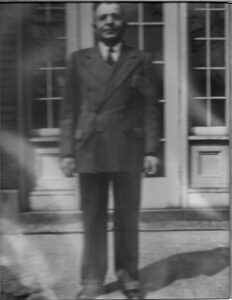
Albert Zalk (1885-1950). Photo probably 1940s.
My mother’s father, Albert Zalk, came over from Europe first-class. He grew up in Eishyshok, near Vilna, Lithuania. He went to Germany to study Torah. In Cleveland he made pomade for blacks during the Depression. He was in Mississippi in the 1920s, residing at first in a rooming house in Duncan, in the Mississippi Delta. Then he started dry-goods stores in Louise and Yazoo City. The Delta: birthplace of the blues. A lot of Jews settled in small towns. My wife’s family comes from Clarksburg, West Virginia. Bob Dylan: Hibbing, Minnesota. All these folks ran “Jew stores” — mom-and-pop hard-goods stores on the main drags.
After Mississippi, Albert returned to Cleveland, mostly fundraising for the Jewish old age home. He, himself, never owned a house.
I’ve donated some Yiddishe Cup memorabilia to the historical society. If you want to know when, and where, Yiddishe Cup’s first gig was, check out the Western Reserve Historical Society, Cleveland Jewish Archives. Or better yet, I’ll tell you here: our first gig was at the Mayfield Road JCC, Cleveland Heights, 1988.
Band genealogy? Don’t get me started.
January 1, 2025 1 Comment
MILLIONS OF CATHOLICS
AND SOME JEWS
When my kids were young, every Chanukah I would take them to the various Jewish bookstores around town to buy decorations and Chanukah books and toys, just so they would get used to these places. At Frank’s Hebrew Bookstore, I thought I was in Poland: tallisim (prayer shawls), spice boxes, yarmulkes. A photo of Koufax on the wall — that would have helped.
Also, I drove my kids to the Christmas lights at General Electric’s Nela Park. That was a family tradition, started by my parents in the 1950s. Why not? Lights is lights.
Yiddishe Cup used to play holiday parties at the Cleveland Plain Dealer. We would stroll table to table. Just about everybody asked for Christmas carols.
Hey, I didn’t start Yiddishe Cup to play “Silent Night.” I said no to all Christmas requests. We would play “Hava Nagila” or tunes from Fiddler on the Roof, if asked. Dick Feagler, a renowned Plain Dealer columnist, gave us the thumbs-up for staying Jewish. Dick apparently liked our Full Cleveland approach. (Full Cleveland meant polka, klez, bandura, tamburitza, salsa. All good.) No rock for Dick.
After strolling to about 10 tables, I cracked; I couldn’t take any more “What? You don’t do Christmas songs?” We played Jose Feliciano’s “Feliz Navidad.” Christmas in Spanish was OK.
—
My family went to KlezKamp in the Catskills during Christmas week for more than a decade. At first I couldn’t get my wife, Alice, to go. We had young kids and she didn’t want to schlep them. One year I took the two oldest kids and went without her. I spent a lot of time in the hotel game room and swimming pool that year. That chemical vat, a k a pool, was only slightly larger than a half dollar, and you had to coat yourself with 100-proof skin cream or get a rash.
The kids and I went to New York City afterward. My daughter, Lucy, then 5, made me carry her everywhere. We didn’t get too far. We went to Popeye’s on Times Square for dinner.
When we got back to Cleveland, Alice said at the doorway, “The kids look anemic!”
Alice, we had beans and rice and lemonade at Popeye’s! (The kids hadn’t been too crazy about the borscht and herring at KlezKamp.)
Alice has never trusted me with food, or childrearing for that matter.
The following year Alice came with us to Klezkamp. All five of us. Alice was a folk dancer and exercise nut; however, Jews at klezmer conventions are not typically exercise freaks. Alice found a nearby indoor tennis court which was so dusty the balls turned black after one set. It was like playing in a parking garage. We went skiing on Christmas. I thought the slopes would be empty, but no, a lot of Asians and Jews from New York City were there.
We snuck over to The Pines resort for ice skating. That place looked like a staging area for a Borscht Belt revival movie. We had a good time checking out trivia contests in the lobby. I’ve got nothing against middle-class Jews. I am one.
My family kept going back to KlezKamp every Christmas. Ikh khulem fun a vaysn nitl. (I’m dreaming of a white Christmas.) And every year Alice would complain: “I can’t believe we’re going to KlezKamp again!”

Jack Stratton, Merlin Shepherd (kneeling) and Lucy Stratton. KlezKamp 1993.
Finally, after 12 years, the brainwashing was complete; the kids knew more Yiddish than oy vey and farklempt, and they knew a lot about klezmer music, and Alice could have, by then, taught the dance classes. And I had met all the old klez guys: Max Epstein, Felix Fibich, Danny Rubenstein, Velvel Pasternak. Paul Pincus, Leon Schwartz, Ray Musiker, Ben Bazyler, Sid Beckerman, German Goldenshteyn, Howie Leess, Elaine Hoffman Watts.
They’re probably all dead now.
I paid my dues.
—
“Merry Christmas” is OK with me. Beats “Happy Holidays.” I once went to a West Side house for Christmas and about 12 Ukrainian girls walked in and caroled us. And they were in full regalia. That was my most Christmas-y experience – until this year.
I went to Mass yesterday. Midnight Mass (which was actually at 4 pm for AKs like me and families with young kids). Joint was jumping. St. Ann Church, Cleveland Heights. A field trip. Park Synagogue’s senior rabbi, Joshua Skoff, led the outing.
The priest prayed for the well-being of the pope, Cleveland’s bishop, etcetera, on down to the “millions of Catholics” throughout the world. Millions — that word hit me. We Jews don’t bandy millions around lightly. That’s some big tent those Catholics have.
I miss KlezKamp. I like the small-ball game of Judaism. Only 15.8 million of us, and we all know each other!
December 25, 2024 3 Comments
DENTAL-ISM
I perused Dental Economics magazine. I owned a medical office building in Solon, Ohio. Did you know it costs about $350/square foot to build-out a dental office. There’s all that extra plumbing involved. Either the landlord pays for the extras or the dentist does. Everything is negotiable.
My building had five dental offices, three doctors’ offices, a chiropractor, a masseuse, and a trucker. The trucker was because it was getting hard to find independent medical practitioners.
I had a lunch date with a dentist-tenant. A young real estate apprentice tagged along with me, to Corky & Lenny’s. He said to the dentist, “A DDS is a license to print money.”
Apprentice, be quiet. We don’t want the dentist to know we know he’s loaded.
The dentist pondered the idea of expanding his office; he had three dental chairs and was thinking about a fourth. And he had some complaints. When I had first met him, he had said, “I’m going to be your biggest pain in the ass.” Correct.
At Corky & Lenny’s, the dentist said the lettering on the medical building’s office-directory sign board in the lobby wasn’t uniform. Some dentists and docs had bigger lettering than he did. “It doesn’t look professional,” the dentist said.
The apprentice had inadvertently bought different-sized lettering. “It was our error,” I said. “The letters are supposed to be the same size.”
The apprentice said, “You know it’s very hard to communicate with sign companies.”
“No, I wouldn’t know about that,” the dentist said.
Onward: the artwork in the lobby. Bad. We had hung pastoral oil paintings by the renowned painter/musician Irwin Weinberger. The Cleveland Clinic had calming artwork; why not my building? The dentist said, “You put up paintings in the lobby, but you can’t afford to paint my walls?”
I sold the medical building two years later. A commercial real estate broker told me, too late: “Docs and dentists all think they’re God.”

An Irwin Weinberger oil painting , 2015.
December 18, 2024 No Comments
TWO OLD COPS
AND ONE YOUNG MAN
The cops had 66% retirement pensions and hung around McDonald’s on Lake Shore Boulevard in North Collinwood. Mostly Slovenians. They were hard-pressed to find a Jew — besides me — to share stories with. These cops had worked with Jews back when Jews lived in the city.
Bill Tofant, a retired cop, said he had worked out every day at the “Yiddishe Meat Cutters Union,” a k a the YMCA. He said, “I can still run a mile at age 73 and can hold my own in fisticuffs, and I can turn my head to see if traffic is coming.”
Tofant said my Great Uncle Itchy Seiger would throw his arms around Bill every time he came into Seiger’s deli on East 118th Street and Kinsman Road. “I couldn’t even spend a nickel in Seiger’s. I had corned beef, turkey, you name it.”
 Tofant and fellow retried policeman Ray Lonchar ignored the sign in McDonald’s dining area: 30 Minute Time Limit While Consuming Food. The manager must enforce these rules. Your cooperation is appreciated. Tofant and Lonchar had known Botnick the pawnbroker — “a good sharp yidl.” Botnick got shot and killed in 1981 at his pawnshop at East 59th Street and Euclid Avenue. I knew Botnick. My dad used to play tennis with Botnick. Lonchar said, “That was done by a jig. Three colored guys went in back and they stuck the place up, and the cameras were just installed. One guy had a horse pistol, yea-long, it stuck out like a sore thumb. It was a military weapon. They picked him up in Rolla, Missouri.”
Tofant and fellow retried policeman Ray Lonchar ignored the sign in McDonald’s dining area: 30 Minute Time Limit While Consuming Food. The manager must enforce these rules. Your cooperation is appreciated. Tofant and Lonchar had known Botnick the pawnbroker — “a good sharp yidl.” Botnick got shot and killed in 1981 at his pawnshop at East 59th Street and Euclid Avenue. I knew Botnick. My dad used to play tennis with Botnick. Lonchar said, “That was done by a jig. Three colored guys went in back and they stuck the place up, and the cameras were just installed. One guy had a horse pistol, yea-long, it stuck out like a sore thumb. It was a military weapon. They picked him up in Rolla, Missouri.”
There had been another Jewish pawnbroker, at East 79th Street and Hough Avenue. “He would buy a stove [gun] that was red hot and smile,” Lonchar said.
There was Uncle Ben, too, at Woodland Avenue and East 55th Street. “He was kind of lax with his records, but he was good to our pawn unit,” Lonchar said.
When the cops ran out of Jew-lore, they segued to Italians, or even Lithuanians. Blacks — nope. “Shondor Birns [a Jewish gangster] — he had the colored in line,” Lonchar said. Birns had controlled the city’s numbers racket.
I patronized the Lake Shore Boulevard McD’s in the mid-1980s, during the dying days of white ethnicity. Back when cars had bumper stickers like “Thank God I’m Slovenian,” “Thank God I’m Irish” and “Thank God I’m Polish.” Funny, I never saw a “Thank God I’m Jewish.”
The Lits (The Lithuanians) . . . They lived near Our Lady of Perpetual Help Church — very close to McDonald’s. Lonchar said, “DPs — I don’t care what nationally they are — they’ll eat nothing but soup for 20 years, three times a day, and save their money, and all of a sudden they buy apartment buildings, invest, and they start rolling. They found out that the streets of America didn’t have gold in them. They had to work for it.”
The Italians . . . with all their “goddamn Italian bullshit.” The Italians lived near Holy Redeemer Church, approximately two miles from McDonald’s. Tofant said, “One thing about Italians, they stick together. If you’re Italian, you’re better than me. You might be the dumbest SOB on two feet, a goddamn dunderhead, but just because you’re Italian, you’re it. The Irish get the way, too, around St. Patrick’s Day.”
The Poles . . . Tofant said, “There was one Polack, Frankie Schant, a safecracker. He bit the cheese and left an imprint. He bit the cheese at the grocery store and they matched his teeth marks. At Pick-N-Pay. And there was this South Side Polack who cut a wire, it was live, and he died.”
Slovenians . . . the best for last, here. Take Charlie Broeckel. (He might not have been Slovenian but the Slovenians claimed him.) Tofant said, “He had class. He went out to Laguna Beach, California, and did a bank heist there. Burned through seven mill worth of shit and negotiable papers. I knew him when he was 10 years old. He was a runner. He always found his way out. And you know what, his mother held a very respectable job. She was beyond reproach, nothing like a stumblebum or anything like that. They lived at 8815 St. Clair.”
Nail a historical plaque to that door!
—
I was doing research — and legwork — for a cop novel back then. (Unpublished novel.) I’ll briefly quote the manuscript, if I can find it. Found . . .
“Stan Zupancic had a glazed turquoise ashtray contoured in the shape of a .44 magnum. His pencil holder was made from World War II antitank shells, and he used a bowie knife to open his mail. A young man, with a growth of brown curly hair that looked like a dead shrub, sat on the other side of the desk.”
December 11, 2024 3 Comments
“GENOCIDE” — WHAT DOES IT MEAN?
This essay was in the Cleveland Plain Dealer last week . . .
“Genocide” — what does it mean?
CLEVELAND HEIGHTS, Ohio — Sean Martin, the assistant curator for Jewish history at the Western Reserve Historical Society, once taught an online course called “Comparative Genocide.” The course was offered through Gratz College, in Philadelphia. I said to Sean, “I think Don DeLillo wrote about Hitler Studies in a novel. That was a novel. ‘Comparative Genocide,’ is that a real course?” It was. (This was 13 years ago.) Now it’s called “Genocide in the Modern World.”
“Genocide” – the word – what does it mean?
Pope Francis, in his new book, says that Israel’s retaliation in Gaza should be investigated to determine if it meets the legal definition of genocide. Patricia Heaton — a former Clevelander, Catholic, and TV actor – said the pope should “look up the definition of genocide.”
Heaton also said on “Elizabeth Vargas Reports” that, “Israel is trying to find the hostages, release them, take out the Hamas leaders and end the war.” She said, “It’s time for every American, and in particular Christians, to stand up and make sure our representatives know they have to help Israel.”

(Illustration by Ralph Solonitz)
The word “genocide” was coined by a Polish Jewish lawyer, Raphael Lemkin, in 1944. He ingeniously combined the Greek “genos” (tribe) and Latin “cide” (killing). Genocide, he wrote, is the slaughter and attempted elimination of a people, a culture, an ethnicity.
Killing a lot of people – is that genocide? It’s most often war. For instance, America bombed Germany. That was war. Germany sidetracked its military effort specifically to gas Jews-for-being-Jews. That was genocide.
I visited an old college friend, John, in Chicago. His front door had a poster, “Stop the Genocide in Gaza.” We talked about old times. Toward the end of our what’s-up conversation, I said, “What’s with the sign?” He had gotten it from the radical group Jewish Voices for Peace, so the sign was “kosher,” John said. John isn’t Jewish.
One question, John: If the Israelis are committing genocide, why are there some 7 million Palestinians in the Middle East today, including more than 2 million in Gaza alone? There had been about 1.2 million Palestinians in 1947. Israel is doing a lousy job of committing genocide, apparently. I didn’t mention any of this to John because I was timid.
Earlier this month, I finally spoke up — at a Cuyahoga County Council meeting downtown. I spoke during the “public comment” portion. Granted, speaking to 11 somewhat-bored council members was a lot less fraught than telling an old friend where to go. The council members probably would have preferred hearing about countywide childhood mental-health issues or summer youth-employment programs, but a lot of commenters wanted to talk Israel/Gaza. I said to the council, “Some people think there are three kinds of Jews: Reform, Conservative and Orthodox. Wrong. There are these three types: American Jews, Israeli Jews, and victims of the Holocaust. Six million to 7 million each. We don’t want the Jews of Israel to be wiped out.”
The county has invested $16 million in Israel Bonds. (The bonds aren’t a gift. The county gets the money back plus interest.) Some anti-Israel speakers used the word “genocide.” A woman talked about local issues – and even used the word “genocide.” She said, “Think about the genocide here in Cleveland with the homelessness.”
Hamas, Hezbollah and Iran have repeatedly said – and acted on – their desire to eliminate Israel — the one Jewish state, home to half the Jews in the world.
That’s genocide. Update your dictionary.
December 4, 2024 3 Comments
THANKSGIVING GIG
The mother of the bride thought Thanksgiving Day would be a great time for a wedding because nobody would come. The groom’s side was from New York. Flights to Cleveland would be expensive. And many Cleveland guests would skip the wedding to eat Thanksgiving dinner at home with their kids. The cost-conscious mom was cutting serious corners.
 Yiddishe Cup musicians rescheduled their personal Thanksgiving dinners to play the gig. Not an easy task, but doable. Then the mom called me again and said the bride wanted a different band. What? Who? I usually ask who the other band is, but I was so mad — mostly at myself because I had forgotten rule #1 in the wedding-band biz: it’s all about the bride. The bride, not the mom, picks the band.
Yiddishe Cup musicians rescheduled their personal Thanksgiving dinners to play the gig. Not an easy task, but doable. Then the mom called me again and said the bride wanted a different band. What? Who? I usually ask who the other band is, but I was so mad — mostly at myself because I had forgotten rule #1 in the wedding-band biz: it’s all about the bride. The bride, not the mom, picks the band.
I got a call from a bat mitzvah mom. She was a talker, just like the very frugal wedding mom. The bat mitzvah gig was going to be for TG weekend but not on TG itself. I didn’t pitch the mom too hard. I wasn’t crazy about playing on TG weekend. I said, “Yiddishe Cup has been around for decades. You’ve seen us. Everybody has seen us.”
She hired us. Then she canned us. She said her husband was sick. So what? Yiddishe Cup has played for sick people — even dead people; we once played a luncheon where the mom of the bat mitzvah had died the day before. We played in the family room instead of at the party center.
The bat mitzvah mom — the one who wanted us for TG weekend — said her husband had become depressed. The husband, a doctor, had lost a patient that week. Doctors lose patients all the time, right? The mom wanted to change the bat mitzvah date and the number of musicians.
Forget it.
What else can I say?
Happy Thanksgiving.
November 26, 2024 2 Comments
TICKTIN: THE LAST OF
THE KINSMAN COWBOYS
Harold Ticktin died on November 12 at 97. He was the last of the Kinsman Cowboys — guys who hung out on Kinsman Road and BS’d (pre-internet and TV). This blog post is a thoroughly “reported” piece on the only-and-only Ticktin. It helps that I wrote it 12 years ago, while Harold was still alive. I was in steady contact with Harold throughout the years. Arrivedarci, Harold.
—
2012
Harold Ticktin writes a weekly column for the Cleveland Jewish News on Yiddish. For instance, he writes about what balabuste means, or balegole. (Female boss and wagon-driver.)
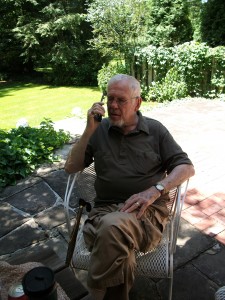
Harold Ticktin, Shaker Heights, 2012
Also, Harold occasionally reflects on early-20th century leftist politics for magazines such as Jewish Currents.
I asked Harold for a couple Yiddish translations. I was in his backyard in Shaker Heights. I wanted to know Yiddish permutations on “How’s it going?” — everything from “How are you?” to “What’s happnin’, man?” Ticktin gave me some options, none perfect, and concluded, “Translation is treason.”
He continued, “Listen, there was this pharmacist who did a big business in trusses – you know what a truss is?”
“Yes.”
“The pharmacist’s slogan was Ayer kile iz undzer gedile — your hernia is our pleasure. I told the pharmacist that was a horrible translation. He told me to come up with a better one. I said, ‘Your rupture is our rapture.’ Wouldn’t that make a great bumper sticker for an abdominal surgeon?”
“Did you make that up — your rupture is our rapture?” I said.
“That’s a true story. It’s an absolutely true story.”
Ticktin is a retired workers’ comp lawyer. He can speak decent Italian, French and Spanish, as well as Yiddish. One of his favorites translations is All Screwed Up, he said, for the Lina Wertmuller film Tutto a posto e niente in ordine, which literally means “everything ready, nothing works.” “You don’t translate, you render,” Ticktin said.
Ticktin continued, “James Thurber ran into a woman in Germany who said, ‘I love your work in German.’ Thurber said, ‘Yes, it’s true, my work loses something in the original.’”
Ticktin lives three miles from his old stomping grounds — the Kinsman neighborhood. Harold grew up on E. 154th Street, Cleveland, hard by the Shaker Heights-Cleveland line. He said Shaker had been “hakodesh hakadashim [the Holy of Holies] — the other.” Shaker had been nearly unapproachable, like the inner sanctum at the Temple in Jerusalem. “I didn’t know anybody in Shaker. Maybe one person.”
Kinsman Road was Ticktin’s main artery. He said, “I walked [down Kinsman] from 154th to E. 140th to observe the class struggle. My father was a Yankee. He came over here when he was two. He liked baseball. What did he know about politics? He knew this: Roosevelt was great and Hitler was bad.”
At E. 146 Street, Harold met Peter “The Brain” Ostrovsky. “I was converted to communism by Ostrovsky on the train to the Philly Navy Yard in 1946. I was converted just west of Pittsburgh.”
The upshot: “I saw the God who was to fail, though I still have a warm spot for Marx, for his Lincoln correspondence,” Harold said. “I’m a member of the extreme center now.”
I wanted Ticktin to give me a tour of Kinsman — the proste, working-class Kinsman of his youth. “How about it?” I said. “Now?” Ticktin agreed. We got in my Lolly the Trolley — my Mercury Sable.
***
Stop 1. Woodhill Park at E.116th. Ticktin: “I remember when I was 10 years old [1937] at Woodhill. It was a tremendous swimming pool. Everybody got out of the water. Why? Because Frieda Katz, a geferlikher (dyed-in-the-wool) communist took a swim with a black kid. The place cleared out. This was Frieda Katz from Katz’s Deli at E. 147th and Kinsman.”
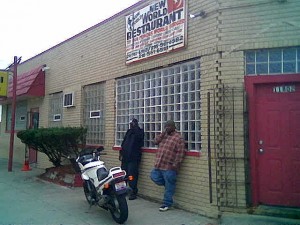
Formerly Seiger’s
2. Seiger’s deli at 118th. “I knew Hymie Seiger best. He went off to yeshiva in junior high. He just left. I didn’t even know what a yeshiva was.”
3. E. 121. “This was where I attended my one Seder as a child. On that street. Very important.” Ticktin eventually became president of his shul.
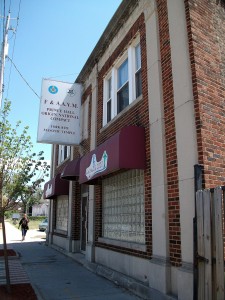
Council Educational Alliance building, now a Masonic hall
4. 13512 Kinsman, the Council Education Alliance. “The apex and GHQ [general headquarters] of my youth. The Communist Club met there.” It was a settlement house.
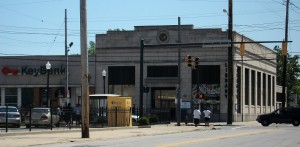
Cleveland Public Library – Mt. Pleasant branch
“In the 1936 election, the Communist Club painted ‘Vote Communist’ in blue on the library at E. 140th. The library had been a bank before. Some members of the club got mad because the graffiti was blue. They said, ‘We need to paint it red.’ Ostrovsky went back to re-paint it and got caught. He was defended by Yetta Land, who handled all the communists. I don’t think Ostrovsky was punished too severely; he was a juvenile.”
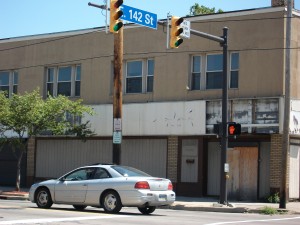
Formerly Spumoni’s (middle store)
5. E 142 and Kinsman. “We called this place Spumoni’s. The real name was Giaimo’s — an ice cream place. The communists met across the street above the Woolworth’s, which is long gone.
“On Saturday nights all the single Jewish guys would hang out here at Spumoni’s and greet each other Marty-style, like, ‘Whadaya want to do, Marty?’ This went on up through the 1940s and 1950s.”
“What’s Marty-style.”
“Like Marty, the movie with Ernest Borgnine. You don’t remember it?”
“No.”
“Single Jews guys — and married Italians — hung out, to go out on the town. I always envisioned a cowering Italian wife in the kitchen back home saying, ‘Tony, when you gonna be home?’”
6. E. 154th / the Shaker Heights line. “Hakodesh — the other,” Ticktin said. “I was in New York once and stopped in at YIVO [Jewish Research Institute] for a list of places European Jews had vacationed before the war. I needed this for a speech in Yiddish. They asked me, ‘You mean intellectuals? Peasants? We’ll get back to you.’ They didn’t get back to me. A couple weeks later, I’m at a gathering of Jews and Poles in Cleveland, an American Jewish Committee meeting, and I meet the speaker, a prominent Polish Jew, Lucjan Dobroszycki, the editor of the Chronicle of the Lodz Ghetto. I ask him about vacation spots before the war. He looks at me and says, ‘This is the second time in two weeks somebody has asked me this question.’ End of the line, Lucjan Dobroszycki — don’t ask me how to spell that.”
7. I drive Harold Ticktin into Shaker Heights. Another end of the line.
—
The photos, above, are from 2012, except the former Seiger’s deli pic, which is from 2010. Seiger’s — later New World Restaurant — is boarded up.
—
The Yiddishe Cup Trio (Alan Douglass, Steven Greenman and Bert Stratton) plays a free one-hour concert 4 pm this Sunday (Nov. 24) at Beth El – The Heights Synagogue, 3246 DeSota Ave., Cleveland Heights.
November 19, 2024 1 Comment
GOING SOLO
“Side Project”: A musician breaks away from his band and does his own thing. Almost all musicians do it, at least on occasion. But because my axe is clarinet, I can’t break away easily. Nobody wants to hear solo clarinet. I’m chained to my farkakte bandmates!
Not true. Last month I was hired at the last minute — a day prior to the gig — for a Holocaust survivors’ luncheon. My accompanist, pianist Alan Douglass, couldn’t make it. But Alan had fortuitously produced some backing tracks for me a while back, just in case.
And this was the case: Alberto Solo. I played “Besame Mucho,” “Di Grine Kusine” and “Moscow Nights.” I even blew shofar, clarinet-style. This was during the High Holidays.
Nineteen people, total. I reached all 19, I think. I sat with them; I ate with them; and played clarinet while seated at various tables. There was some sort of chicken roll, courtesy of the kosher caterer. “You Are My Sunshine,” “Misty,” klezmer instrumentals, and “Tumbalalaika,” of course.
I talked to a Romanian woman about her granddaughter, who plays drums in Broadway shows. A Polish woman jokingly said she has a German brother and an Italian brother. Her brothers were born in DP camps.

Former bandmate Irwin Weinberger, and his father, Herman, 1966. Herman was a Holocaust survivor from Poland.
I got paid by the Jewish Family Service Association and Germany, via an understanding called the Conference on Jewish Material Claims Against Germany — a worldwide Holocaust-reparations cultural-enrichment program.
I’ve previously played this gig with Alan. Two years ago I wrote about it: “Holocaust Remembrance at Cafe Europa. Everybody in the audience had an astonishing story.” (link, no paywall: Wall Street Journal.)
I needed Alan two years ago. Who needs him now?

Alan Douglass, 2011. He’s one of the best musicians in Cleveland. Ask anyone.
November 13, 2024 No Comments
PRECIOUS
You are precious. You suck.
You are overrefined and inauthentic.
A cappella music is precious. All of it. A friend once told me that. Harvey Pekar called Willio & Phillio precious. (Willio & Phillio were a talented 1980s-era Cleveland comedy/music group.) Maybe Harvey called Willio & Phillio precious because they were not anti-social like he was.
Willio & Phillio — the name — was certainly precious, and they should have changed it. Eventually Will Ryan (Willio) went out to Los Angeles to work for Disney, and Phil Barren (Phillio) became a cantor in Los Angeles.

2004
Yiddishe Cup — hate to say it — is precious. But only occasionally, like when we say “oy vey” followed by “olé.” Maybe we should disband.
Peter Laughner, the Cleveland guitarist, died from drug and alcohol abuse at 24. He was not precious. (He was part of the Pere Ubu underground scene.)
One last thing: You’re precious!
November 6, 2024 2 Comments



